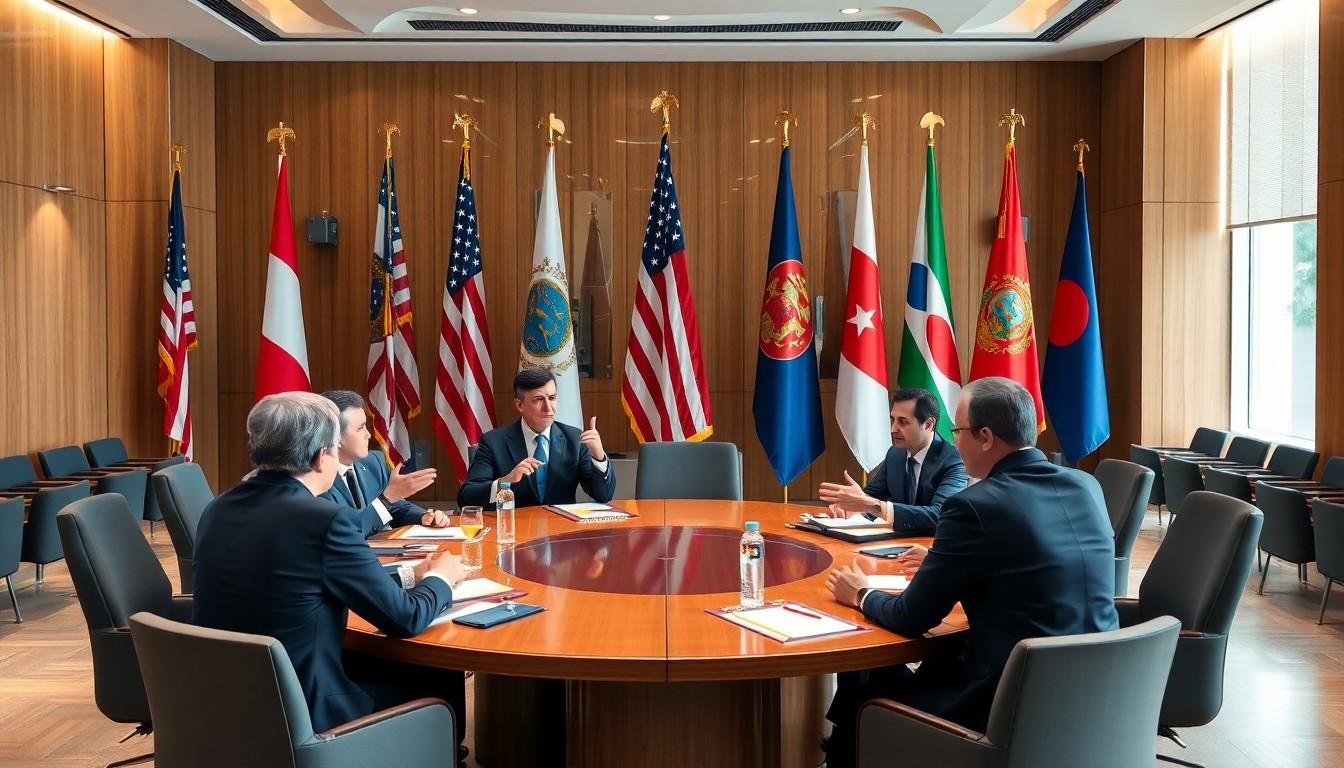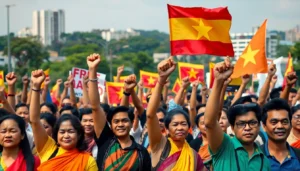Table of Contents
ToggleIn a world where borders are more like suggestions than hard lines on a map, international relations and diplomacy play the role of the ultimate peacekeepers. Picture it: nations chatting over coffee instead of throwing tantrums like toddlers in a toy store. It’s a delicate dance of negotiation, strategy, and sometimes, a bit of charm—because who doesn’t love a good compliment to grease the wheels of diplomacy?
Overview of International Relations and Diplomacy
International relations encompass the interactions between sovereign states and the various non-state actors influencing global affairs. These interactions shape the way countries cooperate, compete, and communicate. Diplomacy plays a crucial role in managing these relationships, using negotiation and dialogue to resolve conflicts while promoting mutual interests.
Countries employ different diplomatic strategies, including traditional diplomacy, public diplomacy, and economic diplomacy. Traditional diplomacy involves negotiations and treaties between governments. Public diplomacy seeks to influence foreign populations and their governments through communication and cultural exchange. Economic diplomacy focuses on using trade agreements and financial incentives to foster partnerships.
International organizations, such as the United Nations and the World Trade Organization, facilitate cooperation among nations. These institutions help mediate disputes, set guidelines for trade, and address global issues like climate change and human rights. Participation in these organizations allows countries to collaborate on pressing challenges while maintaining their sovereignty.
The balance of strategy and charm is vital for effective diplomacy. States must craft approaches that appeal to both domestic and international audiences. Leaders often engage in face-to-face conversations, multilateral summits, and diplomatic channels to establish rapport and build trust with their counterparts.
Understanding the evolving nature of global dynamics is essential for navigating international relations. As globalization intensifies, countries face new challenges that demand innovative diplomatic solutions. By fostering open dialogue, nations can address shared concerns, paving the way for a more peaceful and cooperative world.
Key Theories in International Relations

Various theories explain the dynamics of international relations, shaping how nations interact. Understanding these frameworks provides insights into diplomatic strategies and global interactions.
Realism
Realism focuses on the concept of power in international affairs. It posits that states operate in an anarchic system where no central authority exists. National interest and security dominate state behavior. Realists argue that military strength is vital for survival. They highlight historical examples, such as the Cold War, to illustrate power rivalries. This perspective prioritizes pragmatic decision-making over ideological concerns, emphasizing that conflict is inevitable in a world governed by competition.
Liberalism
Liberalism centers on cooperation and interdependence among states. This theory suggests that international institutions and norms play crucial roles in promoting peace. Economic ties and diplomacy are essential for fostering stability and mutual benefit. Liberalists endorse international organizations like the United Nations to mediate conflicts and develop rules. Globalization has further enhanced cooperation, creating networks that transcend borders. This view emphasizes the importance of dialogue in resolving disputes and building trust among nations.
Constructivism
Constructivism offers a unique perspective by focusing on the roles of ideas and social constructs. It argues that international relations are shaped by the identities and beliefs of states. This theory underscores the importance of how nations perceive each other, influencing their interactions. For example, historical narratives and cultural identities notably affect foreign policy decisions. Constructivists argue that understanding these perceptions can lead to more effective diplomatic strategies, enabling states to connect meaningfully beyond mere power dynamics.
Role of International Organizations
International organizations play a pivotal role in shaping international relations and diplomacy. These entities foster cooperation and offer platforms for dialogue.
United Nations
The United Nations (UN) serves as a primary forum for global discourse. Founded in 1945, it consists of 193 member states. The UN addresses humanitarian issues, promotes human rights, and manages conflicts through peacekeeping missions. It facilitates negotiations and resolutions among nations, ensuring a collaborative approach to global governance. Key agencies like the UN Security Council focus on maintaining international peace. Additionally, the General Assembly allows all member states to participate in discussions. This structure empowers nations to communicate effectively, aligning interests on pressing matters.
Regional Organizations
Regional organizations enhance collaboration among nearby states. Examples include the African Union (AU), European Union (EU), and Association of Southeast Asian Nations (ASEAN). Each body promotes economic integration and regional stability. The AU focuses on promoting peace and security across Africa. The EU fosters economic interdependence and political cooperation among its members. ASEAN emphasizes political dialogue and economic expansion in Southeast Asia. By addressing regional challenges collectively, these organizations facilitate diplomacy and conflict resolution while emphasizing mutual interests among member countries.
Importance of Diplomacy in Global Affairs
Diplomacy serves as a critical tool for managing international relations and fostering collaboration among nations. It emphasizes the necessity of dialogue, which enhances understanding across political, economic, and cultural boundaries. Effective diplomacy assists in mitigating conflicts that may arise due to misunderstandings or differing national interests.
Multiple diplomatic strategies help in achieving these goals. Traditional diplomacy establishes formal relationships between governments. Public diplomacy engages citizens and shapes foreign perceptions, while economic diplomacy uses trade and investment to bolster mutual interests. Each strategy contributes uniquely to building connections and ensuring global stability.
International organizations play a pivotal role in facilitating cooperation through diplomatic efforts. The United Nations addresses issues like humanitarian crises and conflict resolution, providing a platform where nations can negotiate. Furthermore, regional entities such as the African Union and the European Union enhance collaboration among neighboring states, promoting economic integration and developing joint responses to regional challenges.
Building trust through personal interactions remains vital. Leaders participate in face-to-face dialogues and multilateral summits, fostering relationships that transcend formal political boundaries. Globalization intensifies the importance of understanding diverse perspectives, making diplomacy crucial for addressing shared challenges effectively.
The interplay of diplomacy and international relations reveals the complexity of contemporary global governance. Realism addresses power dynamics while liberalism focuses on cooperation and interdependence among states. Constructivism, meanwhile, highlights the significance of shared ideas and identities in shaping diplomatic engagement. These theories collectively enhance comprehension of international diplomacy’s intricate role in maintaining peace and cooperation.
Current Trends in International Relations
International relations today reflect a landscape transformed by globalization and pressing global issues like climate change. The complex dynamics among nations adapt to these evolving trends.
Globalization
Globalization influences international relations significantly. It enhances interdependence among nations as trade, technology, and communication break down barriers. Countries collaborate more on economic issues, leading to increased partnerships. Multinational corporations also play a crucial role in shaping policies, impacting local economies and traditions. This interconnectedness fosters competition and conflict, but it also creates opportunities for cooperation on shared challenges. Stakeholders engage in discussions through forums and treaties, ensuring that diplomacy addresses the intricacies of global trade and governance.
Climate Change Diplomacy
Climate change diplomacy emerges as a top priority for international relations. Nations recognize the urgent need to address environmental crises collectively. Agreements like the Paris Accord highlight global efforts to limit carbon emissions and promote sustainable practices. Countries navigate complex negotiations to develop strategies that respond to climate impacts. Policymakers engage not just with one another, but also with non-state actors like environmental organizations to facilitate broader discussions. Successful climate diplomacy hinges on collaboration, as nations share innovations and resources to mitigate environmental risks.
The landscape of international relations and diplomacy is ever-changing and complex. As nations navigate a world marked by fluid borders and interdependence, the emphasis on dialogue and negotiation becomes paramount. Effective diplomacy hinges on striking a balance between strategy and charm, fostering trust and cooperation.
In this dynamic environment, the role of international organizations and regional entities cannot be overstated. They provide essential platforms for mediation and collaboration, addressing pressing global challenges. Understanding the diverse theories that underpin state interactions enhances diplomatic efforts, paving the way for more meaningful engagement.
Ultimately, as globalization continues to shape the world, the commitment to diplomacy and dialogue remains crucial. It’s through these efforts that nations can work together to tackle shared challenges and create a more peaceful, cooperative global community.




